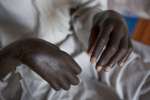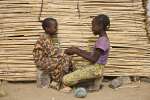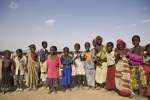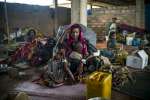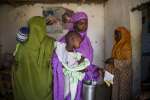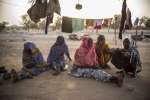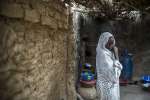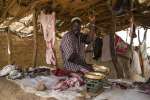- Text size
 |
|  |
|  |
| 
- Français
UNHCR concern over refugee returns to Nigeria / refugees continue arriving in Chad and Niger.
Briefing Notes, 16 January 2015
This is a summary of what was said by UNHCR spokesperson William Spindler – to whom quoted text may be attributed – at the press briefing, on 16 January 2015, at the Palais des Nations in Geneva.
UNHCR is very concerned about the return to Nigeria from Niger on 14 January of hundreds of refugees in a joint operation organized by the Governor of Borno State in Nigeria and the authorities in Niger. According to information received by UNHCR, the refugees were transported in 9 buses to Maiduguri, the capital of Borno State in Nigeria. Another 11 buses are currently parked in the town of Gagamari in Niger's Diffa region, waiting to take more refugees back to Nigeria. Given the volatile security situation in Borno state and the recent attacks by insurgents, UNHCR is concerned about the nature of these returns and has asked the authorities to stop this operation until there are proper safeguards and a legal framework between Nigeria, Niger and UNHCR.
Refugees fleeing the brutal conflict in north-east Nigeria continue to arrive in Niger and Chad telling harrowing tales of killings and destruction. Our teams said that refugees told them about the extreme violence they suffered or witnessed during the attacks on the town of Baga on 3 and 7 January. A woman, who ran away from Baga with her five children and her husband, said she saw insurgents run over women and children with their cars, shoot at people and use knives to cut their throats in the street. She estimated that hundreds had been killed in Baga. The terrified family managed to escape at night before reaching Maiduguri, from where they took a bus to Niger.
In all, some 13,000 Nigerian refugees have arrived in western Chad since the attacks on Baga earlier this month. UNHCR and the governmental Commission Nationale d'Accueil, et de Réinsertion des Réfugiés et des Rapatriés (CNARR) have registered over 6,000 refugees so far. Dozens of refugees continue to arrive every day, many by canoe over Lake Chad to areas such as Ngouboua and Bagasola, some 450 kilometres north-west of the Chadian capital N'djamena. Including the latest influx some 16,000 Nigerian refugees have arrived in Chad since May 2013. We are concerned that refugees from Baga and the surrounding area are choosing to flee over the lake into Chad as this may indicate that the overland route into Niger is blocked by insurgents.
Our teams in Chad report that they have identified 104 unaccompanied children, who have been separated from their families while fleeing the attacks in Baga. They have been placed in foster families while waiting to be reunited with their own.
At the same time, we have started the relocation of some 2,000 refugees who were stranded on the Lake Chad's islands of Koulfoua and Kangalam, to the newly opened site of Dar Es Salam, near Bagasola. The site, which presently hosts some 1,600 refugees is located 70 kilometres from the border with Nigeria and will be able to accommodate up to 15,000 people.
The attacks on Baga have also pushed some 572 people to flee to Niger's Diffa region – with some of them having first crossed through Chad before reaching Niger.
Since the state of emergency was declared in Adamawa, Borno and Yobe states in north-eastern Nigeria in May 2013, an estimated 153,000 people have fled to the neighbouring countries. To date, UNHCR has registered over 37,000 Nigerian refugees in Cameroon, some 16,000 people have arrived in Chad, and the authorities in Niger estimate that more than 100,000 people, both Nigerian refugees and Niger nationals, have arrived from the war-torn North-east of Nigeria. In 2015 alone, the violence has led to an exodus of 19,000 people.
For more information on this topic, please contact:
- In Dakar (Regional), Helene Caux on mobile + 221 77 333 1291
- In Chad, Massoumeh Farman-Farmaian on mobile +235 68 00 05 30
- In Niger, Karl Steinacker on mobile: + 227 921 931 46
- In Geneva, William Spindler on mobile +41 79 217 3011


